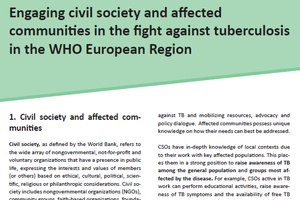Key advocacy fact sheets on TB in Europe released in English and Russian
The three new fact sheets on “Ambulatory TB care”, “Integrated TB/HIV care” and “Engaging civil society and affected communities in the fight against TB” aim to share best practices from the European region on the three topics.
Last week’s Union Conference was an excellent opportunity to launch the Regional Collaborating Committee on Tuberculosis Control and Care (RCC-TB)’s three new fact sheets on “Ambulatory TB Care”, “Integrated TB/HIV Care” and “Engaging Civil Society and affected Communities in the Fight against TB”. They are available in both English and Russian and aim to share best practices from the European region on the three topics.
The fact sheet on “Ambulatory TB care” highlights the added value of outpatient treatment given that TB infectiousness subsides shortly after treatment commences. It maintains that TB treatment must be integrated into primary health care (PHC), with civil society playing an active role in this process. The benefits of ambulatory care are also presented: not only is it far more cost-effective it is also reaps better treatment outcomes.
“Integrated TB/HIV care” outlines numerous models which allow for the integration of TB and HIV services. Suggestions include the screening of patients for TB at AIDS clinics and the provision of HIV treatment at facilities catering for TB patients. A concrete example is provided from Portugal where TB and HIV care was integrated successfully in the city of Porto.
The fact sheet on “Engaging civil society and affected communities in the fight against TB” argues that these actors should be engaged in the treatment process as they understand their communities’ needs and can also provide treatment to key affected communities. However, for this to happen, hurdles such as insufficient funding, low involvement of patients in the drawing up of programmes and negative attitudes towards civil society must be overcome.
The RCC-TB was established by the WHO Regional Office for Europe in 2012 and is a product of the Consolidated Action Plan to Prevent and Combat M/XDR-TB in the WHO European Region. It is an open-source platform, composed of donors, technical agencies, professional societies, as well as civil society and community representatives. These stakeholders are united in their commitment to universal access to prevention, diagnosis and treatment and care to all TB sufferers in the European region. The RCC-TB equally strives to raise awareness about the disease, advocate for resource mobilisation and foster the exchange of best practices. TBEC is currently the Chair of the RCC-TB.
Документы на русском языке:
Интегрированная помощь при ТБ/ВИЧ
Вовлечение гражданского общества и затронутых сообществ в борьбу с туберкулезом
Source: TB Europe Coalition


